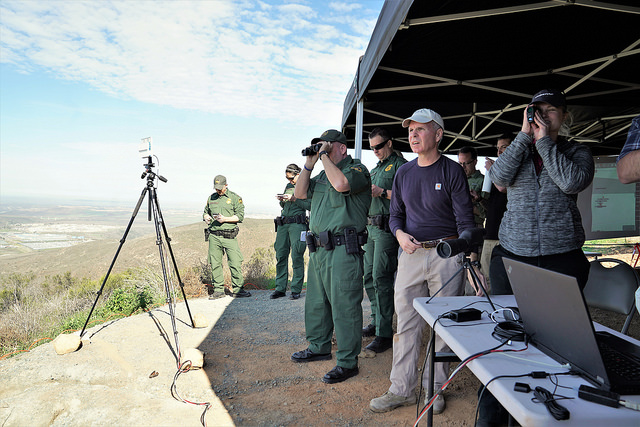Over 25 human rights and tech groups petition the US House of Representatives to not fund “various invasive surveillance technologies that would intrude on the liberties of travelers, immigrants, and people who live near the border.”
The human rights and tech organizations signed an open letter yesterday on Medium expressing concerns that if “new cutting edge technology” were installed at the border between US and Mexico, that technology could later be used against American citizens living way beyond the border.
Read More: Amazon, Palantir are aiding mass deportations of govt ‘undesirables’: report
The open letter highlights five areas of tech that the signing members don’t want to be funded:
- Risk-based targeting: “We oppose the replication and expansion of risk-based systems that have exacerbated current racial disparities in immigration enforcement.”
- Mass surveillance: “Aircraft, including unmanned drones, often include the power to capture the faces and license plates of vast numbers of people who live and work near the border. The government may scrutinize this personal information with machine-learning techniques susceptible to the same biases and problems listed above.
- Biometrics: “Senator Jeff Merkley and the Congressional Black Caucus have expressed serious concern that facial recognition technology would place “disproportionate burdens on communities of color and could stifle Americans’ willingness to exercise their first amendment rights in public.”
- License plate readers: “Border patrol has deployed ALPR [automatic license plate readers] systems not just at the border, but at interior checkpoints as far as 100 miles from the border, a zone within which two-thirds of Americans live.”
- Biometric and DNA data: “We are concerned about the threat that any collected biometric data will be stolen or misused, as well as the potential for such programs to be expanded far beyond their original scope.”
“We also express additional concern with proposals that involve persistent and expansive video and imagery surveillance, sensors, and other technologies that are likely to collect large amounts of personal and individualized information from travelers and border residents,” the letter reads.
Read More: Every move you make IARPA will be watching you
The letter was addressed to:
- Speaker Nancy Pelosi
- Minority Leader Kevin McCarthy
- Minority Leader Steny Hoyer
- Minority Whip Steve Scalise
- Chair Nita Lowey, Chair of House Appropriations Ranking Member
- Kay Granger, House Appropriations
Read More: ‘Authoritarianism is easier in a world of total visibility’: WEF report
The 28 tech and human rights groups that signed the letter were:
- Fight for the Future
- Electronic Frontier Foundation
- 18 Million Rising
- Access Now
- ACLU
- American-Arab Anti-Discrimination Committee
- Campaign for Liberty
- Center for Media Justice
- Constitutional Alliance
- Daily Kos
- Defending Rights & Dissent
- Demand Progress
- Due Process Institute
- Freedom of the Press Foundation
- Free Press Action
- Media Mobilizing Project
- Media Alliance
- Mijente
- Muslim Justice League
- National Immigration Law Center
- New America’s Open Technology Institute
- Oakland Privacy
- OpenMedia
- The Project on Government Oversight
- RAICES
- Restore The Fourth
- RootsAction.org
- SumOfUs
“Ubiquitous surveillance technology poses a serious threat to human rights and constitutional liberties. We call on Congress not to expand these invasive programs with new funding,” the letter concludes.












